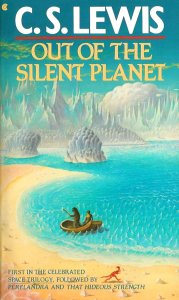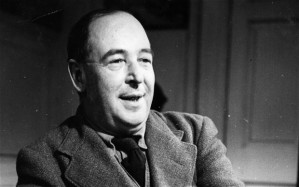 In true C.S. Lewis fashion, Out of the Silent Planet is wrought with philosophic conundrums. Not only do I try to pay attention to the worldviews of works in their entirety (and I urge you to do the same), I also try to identify the worldviews of individual characters in media. One character in Silent Planet is Weston, a physicist who has kidnapped the protagonist Ransom and is taking him to another world. Here is one exchange that has me puzzled in nailing down Weston’s worldview:
In true C.S. Lewis fashion, Out of the Silent Planet is wrought with philosophic conundrums. Not only do I try to pay attention to the worldviews of works in their entirety (and I urge you to do the same), I also try to identify the worldviews of individual characters in media. One character in Silent Planet is Weston, a physicist who has kidnapped the protagonist Ransom and is taking him to another world. Here is one exchange that has me puzzled in nailing down Weston’s worldview:
“As it is, I admit that we have had to infringe your rights. My only defence is doing what has never been done in the history of man, perhaps never in the history of the universe. We have learned how to jump off the speck of matter on which our species began; infinity, and therefore perhaps eternity, is being put into the hands of the human race. You cannot be so small-minded as to think that the rights or the life of an individual or of a million individuals are of the slightest importance in comparison with this.”
“I happen to disagree,” said Ransom, “and I always have disagreed, even about vivisection. But you haven’t answered my question. What do you want me for? What good am I to do you on this—on Malacandra.”
“That I don’t know,” said Weston. “It was no idea of ours. We are only obeying orders.”
“Whose?”
There was another pause. “Come,” said Weston at last, “there is really no use in continuing this cross-examination. You keep on asking me questions I can’t answer: in some cases because I don’t know the answers, in others because you wouldn’t understand them. It will make things very much pleasanter during the voyage if you can only resign your mind to your fate and stop bothering yourself and us. It would be easier if your philosophy of life were not so insufferably narrow and individualistic. I had thought no one could fail to be inspired by the roles you are being asked to play: that even a worm, if it could understand, would rise to the sacrifice. I mean, of course, the sacrifice of time and liberty, and some little risk. Don’t misunderstand me.”
Sometimes worldviews are hard to pin down. Rarely are they formulated enough to fit into one worldview category. Often they are a potpourri of different beliefs. Weston here is no different. His morals seem to be derived from some sort of nihilistic thought. He asserts that individual lives or even the lives of millions have no significance. Yet he acknowledges that Ransom’s rights have been violated and he claims that it is good for Ransom to sacrifice time, liberty and safety for the cause of science. If Ransom’s life held no significance, then he has no rights of which he can be stripped and the loss of time, liberty, and safety does not qualify as a sacrifice.  Does this contradiction stem from a contradiction in thoughts of the author, or are Weston’s inconsistencies written into his character to demonstrate the inconsistencies of naturalistic/nihilistic thought? Given Lewis’ propensity to philosophy and apologetics, my guess is the latter.
Does this contradiction stem from a contradiction in thoughts of the author, or are Weston’s inconsistencies written into his character to demonstrate the inconsistencies of naturalistic/nihilistic thought? Given Lewis’ propensity to philosophy and apologetics, my guess is the latter.
What do you think about Weston’s statements and worldview?
